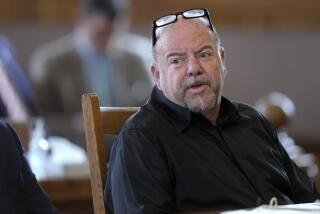PUC Orders PacBell to Issue Refunds
State regulators Thursday ordered Pacific Bell to issue customer refunds that could total nearly $17 million and remove a repeat-dialing feature that was added to millions of phones statewide even though it irritated customers and interfered with computer modems and fax machines.
The “prompted repeat dialing” feature, deployed throughout California more than a year ago, interrupts a busy signal and plays a recording offering to keep trying the line until it is open--for 95 cents.
For the record:
12:00 a.m. Aug. 25, 2001 FOR THE RECORD
Los Angeles Times Saturday August 25, 2001 Home Edition Part A Part A Page 2 A2 Desk 2 inches; 50 words Type of Material: Correction
Phone service--A story in Friday’s Business section incorrectly stated Pacific Bell’s estimated monthly and yearly revenue from a new phone feature called Prompted Repeat-Dialing. The company takes in about $500,000 per month, or about $5 million per year, from customers who pay per-use fees for Prompted Repeat-Dialing or regular Repeat Dialing.
An annoyed California Public Utilities Commission ordered refunds, saying the redialing feature was not approved, harms consumers by tripping up computer and fax machine dialing and amounts to an unsolicited advertisement for the phone company.
To underscore its discontent, the PUC ruled that PacBell must halt the feature and reactivate it only for customers who request the feature in writing.
The PUC, unable to track all customers affected by the repeat-dialing feature, ordered the San Francisco-based phone company to at least compensate customers with unlisted service, who pay an extra monthly fee to thwart solicitors.
For each month that the repeat-dial feature was active, PacBell must refund the 28-cent monthly fee paid by its 4.3 million unlisted customers. The company has had the service in place for 14 months, making PacBell liable for refunds of at least $16.8 million.
PacBell spokesman John Britton said the company is “deeply disappointed,” and that it will seek a rehearing on the matter.
“We believe the real losers are California customers,” Britton said. “If this decision stands, we will be forced to reevaluate whether to continue offering the service.”
Britton said PacBell’s parent company, San Antonio-based SBC Communications, has instituted the feature in many other states. PacBell and other phone companies already sell a separate repeat-dialing feature, which automatically redials the last number called when users press *66. It then retries the number for up to 30 minutes. Customers pay a small fee for each use.
Thursday’s punitive action from the PUC is the latest in a string of moves prompted by promotions from the local phone company, which serves more than 90% of California households.
In what could be PacBell’s biggest complaint case yet, the PUC is considering fining the company for a range of marketing abuses dating to 1997. The case, first filed in 1998, has produced five different proposed decisions, all of which find PacBell guilty of marketing misdeeds.
The case has created sharp divisions within the five-member commission, with four members writing separate draft decisions, each with different fine amounts. The proposed fines range from $2 million to $49 million, which would rank as one of the PUC’s largest. The PUC has not voted on a final decision, despite listing the matter on meeting agendas for more than a year.
In the repeat-dialing case, PacBell ran afoul of the PUC by adding the prompted repeat dialing feature without getting approval from the commission. PacBell believes conversations its employees had with two PUC staff members amounted to clearance to start the service.
Last spring, PacBell tested the feature in 179,000 households in Concord, Visalia and San Diego. The company tested reaction to the service and the recorded message: “The number is busy. For 95 cents, let repeat dialing call you back when the line is free. To use it, just press 3. If you subscribe to repeat dialing, there is no additional charge.”
PacBell’s tests showed that the combined sample households used the service about 1,000 times a day. At that rate, the company’s 95-cent feature could bring in revenue of about $59,000 a day, or $198 million a year, just from its California customers.
However, the company’s surveys also showed that 75% of the 79 test respondents disliked the service, and 355 people in the test area called PacBell to block the feature, according to the PUC.
After PacBell launched the feature statewide, the complaints began to mount. One customer said it kept thwarting his efforts to get on the Internet by inserting the busy signal announcement and preventing his modem from moving on to another dial-up number.
In a complaint to the PUC, the customer called the feature “a gross imposition,” adding “Take it off my phone; I hate it.”
More to Read
Inside the business of entertainment
The Wide Shot brings you news, analysis and insights on everything from streaming wars to production — and what it all means for the future.
You may occasionally receive promotional content from the Los Angeles Times.










